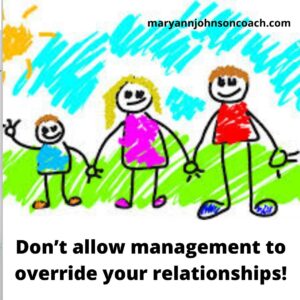 I had a funny conversation with a single dad. We were talking about how to keep things clean and how to get our kids to clean. I noticed he wasn’t an efficient housekeeper. He felt he was doing ok, and it was ok, just not very clean. : ) This comes from someone who was a professional housekeeper for almost two decades.
I had a funny conversation with a single dad. We were talking about how to keep things clean and how to get our kids to clean. I noticed he wasn’t an efficient housekeeper. He felt he was doing ok, and it was ok, just not very clean. : ) This comes from someone who was a professional housekeeper for almost two decades.
Despite having a master’s degree and being a speaker and a writer, I did this work because I like cleaning, I got paid well because I am terrific, and I was my own boss and had time to write, teach, and speak. I know clean. Trust me that can be a blessing and a curse. You can’t imagine how often I have had to force myself not to offer my services to clean someone’s restroom, especially at gas stations and fast-food places. LOL
This dad told me they have a long-time family friend named Steffanie. She is a natural-born cleaner, like me. When he asked the kids to clean anything they would respond, “Dad’s clean, or Stefanie’s clean.” Gotta love kids!
Some of us have a knack for cleaning and we find it satisfying. I’ve been this way since I was a kid. Nobody had to tell me to clean my room. But what happens when your kids are not born cleaners? How do you get the chores done without breaking the relationship bank?
When I was a kid the only consequence for not doing your chores was a spanking. I got my share of those. All parents have some form of consequence that we hold over our kids to get them to do their work. This is because we not only need them to pitch in, but we also want to teach them to be responsible adults. It is our job. But again, getting it done without breaking the relationship bank is important. If we are always yelling, grounding, or spanking, well, relationships will suffer.
Can I share a truth with you that you won’t know until you get there? No matter how clean your home is, no matter how fabulous your system for chores is, some of your adult kids will be neat and tidy as taught and some won’t. I have seven adult kids and I am there. LOL Knowing this makes it easier to not blow a gasket over chores. That is helpful to me now, as I live with four teens.
Two Successful Systems We Used for Management & Relationships
My goal in this article is not to discuss different systems for getting kids to do chores. This article isn’t even about how to get kids to do chores. It’s about keeping home management and teaching in place and reinforcing good relationships at the same time. I’m going to share two things that I did that worked for a time and helped build relationships. One is truly radical. It will leave some of you speechless and others of you laughing. I’m sharing them because they illustrate the importance of relationships over home management.
1. One successful thing we did was put a card above the light fixture in each room that a child might be called upon to clean. This card itemized each thing that had to be cleaned in that room. On any given day, before you could go out to play, you had to do your assigned chore. When your chore was finished the only requirement was that you had to come and tell me personally you were finished, and I would come check it out.
If needed, I would point out the one or two things that required a bit more work or say, “Ok, have fun.” I made sure that despite my overly orderly personality, I kept my expectations age-appropriate. Please note, that this was well into my parenting. I had been required to learn to stop making chores the most important thing because, in my mind, cleanliness was at the top of the list for a time.
I loved this system because I didn’t need to yell. Now and then I would have to track someone down and remind them that their chore came before play. Then we would walk home together and have a mini-conversation on whatever we saw so things stayed calm.
One day, my pre-teen son Barry, came and told me his chore was done. He had been assigned the upstairs bathroom. I smiled and said, “OK, I’ll come and take a look.” Barry‘s face took on a thoughtful expression and he replied, “Just a minute. I’ll be back.” Then he took off up the stairs. About ten minutes later he returned and let me know he was ready for me to see his job. It was well done for a pre-teen boy. : ) I hugged him and off he went to the field to catch snakes.
This system was awesome and worked for a few years. Then we had older teens and that changed everything!
2. One of the most common chores for kids is cleaning their bedroom. There’s the weekly ritual of saying, “Go clean your room.” Then we spend the next few hours cajoling and possibly yelling to get our kids to behave responsibly and get the room cleaned. In our world, this was true with my three boys as they moved into their teens.
Here is the very unconventional thing I did.
I told my sons that they oversaw their rooms, and I wouldn’t interfere if the mess wasn’t spilling into the hall, and I couldn’t smell it. I know, crazy. Then I added, “However, every six months your room must be cleaned well. You must sort your junk, order your drawers and closet, and clean under the bed. Either you do it, or I will. There will be no argument. If you don’t want me in your room, then when I tell you we are at the 6-month mark you clean it. If you need help, I will assist you.”
“If you choose not to clean your room by the specified date, then I will. However, if I clean your room then I decide what stays and what goes, clothes, toys, games, whatever.” This worked for me because if you recall, I LOVE cleaning and am very proficient at it.
I told you this was unconventional. There had been too much arguing, consequences, many of which couldn’t be enforced, and yelling. Their rooms were very messy with dirty clothes on the floor for days or weeks, and clutter all over the place. At this point, the boys were in charge of doing their own laundry. Wash it or wear it dirty. We also had a hook in each room, and you got one towel a week. If it was left on the floor and smelled, you were out of luck. My kids knew by then, that what I said I meant, and laundry and towels were never an issue.
Clothes were shoved into drawers unfolded folded. OK, if you don’t mind wrinkles then I don’t either. They all knew how to iron and on occasion, would if it involved a girl. But for school, no way. These were the 80’s after all.
Barry and Seth left their rooms for me to clean every six months. I got rid of so much junk! I LOVED it and they couldn’t have cared less. However, Andrew always cleaned his room and did an excellent job because he didn’t want me sorting his junk. He never needed any assistance. LOL This crazy system stopped the yelling, pouting, sneaking off, and all the rest. It allowed these almost-adults to make decisions about how to manage themselves and their space.
As a very orderly person, who was an excellent cleaner, it was a challenge for me. But the upside was that I learned to be more flexible, allow others to make decisions different than mine, and to turn and walk away. These lessons came in very handy during our families’ hard years.
Most of you will not think this is a very good system but it worked for us, for a time. I am sharing it because it is just one of many systems we used throughout the years, that were designed to get the job done and keep relationships intact.
As a parent running a household, you have a million things to think about and manage. You have all the physical tasks required to maintain the home both inside and out. You have all the jobs that keep the people in your home cared for—meals, laundry, housekeeping, and chauffeuring kids from place to place. Managing all of this is a big job. However, this is the “doin’ it, doin’ it, doin’ it.” To be successful in your family relationships, you need to stop “doin’ it” all the time and put effort into working on your family. That’s the relationship part of the job of parenting.
I know the system I used with my teen boys was odd and wouldn’t be found in any parenting book. My two boys who let me clean their rooms are now adults. They know how to clean and organize. Barry is part owner of three businesses and Seth managed two separate businesses and created a training system for one of them. Andrew, the one who always cleaned his room at the 6th-month mark, is a father, a good husband, and a hard worker. Their homes are orderly and clean.
We need to teach our kids to clean. They need to learn to manage their responsibilities. You will try many systems. Some will work for a time and others won’t be successful at all. It is all an experiment.
But ultimately your relationship with your children matters more than whether they clean well or not. The dad I talked with had a lot of fun with his kids and they loved him. They spent time together and they were learning to clean, sometimes Dad’s way and sometimes Stephanie’s way. As adults, they will decide where they fall, and it will be OK.
There are payoffs when we learn to put relationships ahead of home management.
THE PAYOFF OF BALANCING MANAGEMENT AND RELATIONSHIP
PAY OFF 1—Reduced Stress and Increased Energy
Sharon Silver has expressed this perfectly: “Focusing on love and creating a connection causes unseen properties to magically eat up stress. It’s as if stress and love can’t exist in the same space. When a stressed-out parent takes a few minutes to sit and lovingly reconnect to their child, heart to heart, it’s like a key has been inserted and the stress begins to dissolve” (Silver, “4 Minute Way to De-Stress”).
When we put systems in place that put relationships over management, we will be less stressed. I have lived on both sides of this coin.
PAY OFF 2—Extended Patience
When we stop managing things and look at our children, when we see them and hear them, our patience level increases. Remember one of those moments when you felt angry or frustrated but stopped and reached out to your child lovingly, and you felt the negative feelings dissipate? It may not happen often but I’m sure it has happened. It magnifies the feeling of success as a parent. These moments of extended patience help you stay in control when things are heating up in your life.
PAY OFF 3—Reduce the Need for Consequences
You saw how it worked with my first system. I didn’t need to repeat myself or nag. They could take all day but couldn’t go play till done. And Barry understood what was needed to get the go-ahead. No grounding. No yelling. No spanking. And in today’s world, no need to take away the tech. Truth is, sometimes one would choose to stay home all day and not do the work. They also knew it would be there waiting the next day. LOL
PAY OFF 4—Children Who Know They Matter
As adults, we’re end-product driven, and it can become a challenge to not get caught up in management over relationships. We tend to focus on the job at hand, how it should be done, and how it turns out in the end.
This keeps us out of relationship mode. Parents can care too much about the outcome and too little about the relationship. When we take the time to work on our parent/child relationship we allow them to know and love us, and we let them know they matter more than whatever job or task is at hand. This can happen while teaching responsibility.
PAY OFF 5—Enjoyable Relationships
To have fulfilling and enjoyable relationships with those in our care, our children, we need to stop managing so much and give more time to building the relationship. I am laughing because this is how it is with me and my mom. I can get caught up in the ‘doin it’ and forget that how she feels matters more. My boat is your boat. : ) Relationship is everything, and ultimately it depends on you!
PAY OFF 6—The burden of Parenting (or caregiving LOL) is Lightened
Not much feels better than laughing with your child or getting a sloppy kiss and hug when you’re feeling frazzled. Oh yes, and a silly smile and an eye roll from your teen is awesome. : ) It’s sublime hearing the words “You’re the best Mom/Dad.” There’s a feeling of renewal and peace as you rock quietly, holding a child. This is how I felt as I hugged Barry after I checked out the bathroom and then sent him off to hunt snakes.
In the end, relationships will surpass just about everything else in their ability to bring happiness, peace, and satisfaction to your family. It makes the job of parenting lighter.
We all want to prepare our kids to be out on their own. I have been in that place. I have also seen how it worked out as the seven of them became adults.  My daughter Jodie who kept her room clean as a kid, often has a messy living room and kitchen. I live in a 4-generation home, and I know. However, she can clean it up and do an amazing job when there is an opening in her busy day as a single mom with four teens, one with severe CP. Often, she chooses to work on relationships rather than cleaning the kitchen and living room. It always amazes me when she gets off work and then takes Mary to do an errand, drives Ben to a friend, or helps Jack with the horses.
My daughter Jodie who kept her room clean as a kid, often has a messy living room and kitchen. I live in a 4-generation home, and I know. However, she can clean it up and do an amazing job when there is an opening in her busy day as a single mom with four teens, one with severe CP. Often, she chooses to work on relationships rather than cleaning the kitchen and living room. It always amazes me when she gets off work and then takes Mary to do an errand, drives Ben to a friend, or helps Jack with the horses.
Before I knew better, I would have let all this go in order to clean my home, and I would have done a lot of scolding in the process. Despite my early ignorance, my children have learned well.
Ninety percent of people on their deathbed say their biggest regret is they didn’t get closer to the people in their lives and almost all parents whose children are grown say they wish they’d spent more time with their kids. I am right there with them!
One day you’ll be older. Your kids will be gone from your home. You won’t care how clean your house was, how spectacular the yard is, if you homeschooled or public schooled. You won’t value the amount of money you made, how often you went to Disneyland, or what college your kids attended. You won’t care if they’re carpenters or lawyers. You won’t care if you impacted thousands of people as a writer, speaker, or teacher. What you will think about more than anything else is the condition of the relationships within your family. That, my friends, is what you’re going to treasure most.
Take time now to make them sweet.
You can learn more on this subject and read other wonderful examples and stories in the book Becoming a Present Parent: Connecting with Your Children in Five Minutes or Less. See Chapter 9 ADJUST YOUR APPROACH

